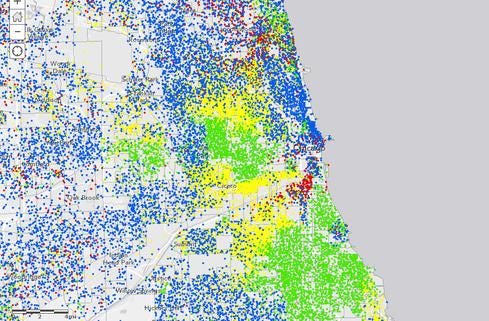GAO Pushes Better Reporting Of Federal Grants Data
OMB must strengthen guidance related to federal grants and loans to ensure maximum transparency and reliability of key financial data, says GAO.


Government Data + Maps: 10 Great Examples
Government Data + Maps: 10 Great Examples (Click image for larger view and slideshow.)
The Office of Management and Budget needs to issue better guidance to federal agencies on how to furnish accurate data on assistance awards they give out because the data currently on USASpending.gov is incomplete and unreliable, says a government watchdog agency.
The Government Accountability Office alleges in a report released August 1 that agencies did not report, or reported late, data on grants and loans totaling approximately $619 billion for 302 programs in fiscal 2012 because of critical gaps in OMB guidance on the matter. The Health and Human Services Department topped the list of errant agencies, with $543.8 million in assistance awards for 27 programs either not reported or reported late.
A key finding of the GAO investigation was that only between 2% to 7% of all assistance awards reported on the website contained information that was consistent with agencies' source records for 21 data elements.
[Nonprofit tackles the problem of unemployment for returning service members and their families. Read Cloud Tools Help Military Vets, Spouses Find Jobs.]
The Government Funding Transparency Act of 2008 put the onus on the OMB for ensuring that USASpending.gov contains accurate information not only on federal contracts, but also on grants and loans. While contract award information on USASpending.gov is generally complete and reliable, the data on assistance awards is neither, said GAO.
Although OMB in turn placed the responsibility on federal agencies to comply with data reporting and data transparency requirements, the need exists for OMB to find a more effective and comprehensive oversight process to ensure agency compliance, asserts GAO.
The shortcomings with regard to data on assistance awards violates the Government Funding Transparency Act of 2008, which charged OMB with ensuring the existence and operation of a website that captures specific information on federal awards. That website, USASpending.gov, is intended to promote transparency in government spending by furnishing the public with the ability to track where and how federal funds are spent.
"Until these weaknesses are addressed, any effort to use the data will be hampered by uncertainties about accuracy," GAO said.
In February 2014, the OMB transferred responsibility for operating and maintaining USASpending.gov from the General Services Administration to the Treasury Department's Fiscal Service, GAO noted. That transition was still in progress at the time the investigation was completed in May.
To determine the accuracy and frequency of reporting, GAO investigators studied a representative sample of 385 assistance awards from fiscal 2012 to determine the degree to which agencies adhere to reporting requirements and whether the data posted on USASpending.gov is consistent with agency records.
The gaps in guidance pertained to confusion over exemptions from standard reporting requirements, as well as uncertainty over how to report awards to foreign recipients.
Investigators found that some agencies claimed they were exempt from having to report their assistance awards because the awards involved non-appropriated funds, GAO said. But vague guidance made it unclear whether such exemptions are allowed.
Officials at some agencies, such as the Millennium Challenge Corporation, said that they could not report the data for certain assistance awards because the awards were made to foreign entities. But that claim is without merit because existing OMB guidance describes how foreign grants and loans should be reported, according to GAO.
The GAO acknowledged in its findings that the OMB has taken corrective action in the past to improve the completeness of data for assistance awards published on the USASpending.gov website. For example, OMB issued a memorandum in June 2013 directing agencies to take steps to ensure that data on USASpending.gov is consistent with agency financial records.
Investigators also found that agencies failed to submit the required information for 342, or approximately 15%, of the 2,183 programs listed in a federal catalog.
The GAO found that certain data elements, such as the name of the recipient, were almost always provided, but others, such as the primary location of performance, were frequently missing. Determining the accuracy of other data elements -- such as award amount, transaction type, and program source -- was problematic because of incomplete or inadequate agency records, GAO said.
"While OMB placed responsibilities on agencies to ensure their reported information is accurate and substantiated by supporting documentation, this approach has had limited effect on the overall quality of the data on the website, reinforcing the need for a more comprehensive oversight process by OMB and more specific guidance from OMB on how agencies are to validate information reported to USASpending.gov," GAO said. "Until these weaknesses are addressed, any effort to use the data will be hampered by uncertainties about accuracy."
To improve the completeness and accuracy of data submissions to the USASpending.gov website, GAO recommends that the OMB director clarify guidance on agency responsibilities for reporting awards funded by non-annual appropriations, the applicability of USASpending.gov reporting requirements to non-classified awards associated with intelligence operations, and the requirement that award titles describe the award's purpose.
In addition, GAO recommended that the OMB director develop a government-wide oversight process that can regularly assess the consistency of data reported by federal agencies to USASpending.gov. "If properly implemented, these procedures could better ensure that agencies report future assistance awards," GAO said.
OMB staff generally agreed with the recommendations. They noted that the recommendations are consistent with actions required by the Digital Accountability and Transparency Act of 2014, which President Obama signed into law on May 9.
The DATA Act mandates that the Treasury Department and OMB establish a government-wide financial data standard and conduct periodic reviews of agency spending data by inspectors general.
OMB staff told GAO that while they plan to work with the Treasury Department to consider interim steps to improve data quality, they said they did not want to inhibit current or future agency efforts to comply with the DATA Act.
GAO countered that its recommendations "are not in conflict with adherence to the act but rather will help agencies to take steps towards achieving the core tenets of data transparency reflected in the act."
Our new survey shows fed agencies focusing more on security, as they should, but they're still behind the times with cloud and overall innovation. Get the new IT Priorities In Order? issue of InformationWeek Government today.
About the Author
You May Also Like






